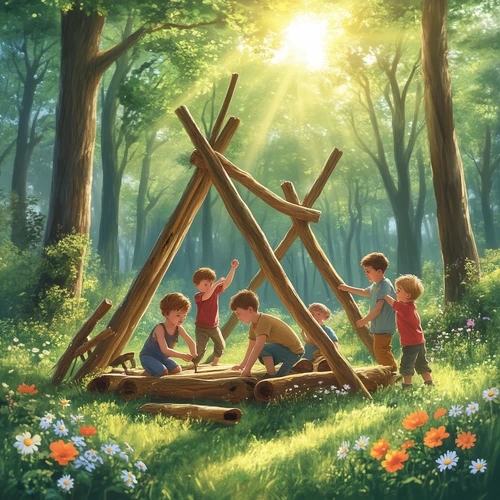Nature Play is a powerful, evidence‑driven approach that invites children to explore, discover, and connect with the natural world. Unlike structured indoor activities, nature play offers an unplanned, dynamic playground where sensory exploration, imagination, and physical movement flourish.
When children are encouraged to wander in forests, gardens, or along streams, they develop critical skills such as problem‑solving, teamwork, and perseverance. Research shows that regular outdoor play reduces stress hormones, improves attention spans, and boosts overall well‑being. By allowing kids to feel the texture of bark, hear the rustle of leaves, and taste fresh dew, nature play stimulates the five senses and nurtures curiosity.
Key benefits of nature play include:
- Physical health – Enhanced motor skills, increased cardiovascular activity, and stronger immune responses.
- Cognitive growth – Improves memory, creativity, and the ability to focus in everyday tasks.
- Emotional resilience – Encourages self‑confidence, reduces anxiety, and promotes mindfulness.
- Social bonding – Children learn to share, negotiate, and empathize through cooperative games.
- Environmental stewardship – Early exposure to nature fosters a lifelong respect for sustainability.
To integrate nature play into a family’s routine, start with short, 10‑15 minute walks during the day. Let children help with gardening, collect stones or leaves, and build simple shelters from sticks. Encourage open‑ended questions—“What can we do with this twig?” or “Do you think that rock is safe? Why?”—to promote inquiry and discussion. Safety is important, but trust the child’s natural instincts; most outdoor experiences require only basic precautions like hand washing and sun protection.
Educators and caregivers can transform any outdoor space into a learning laboratory. By labeling trees, documenting insect life cycles, or charting the growth of potted plants, children connect abstract concepts with tangible evidence. Even a backyard with a small pond or a community garden provides a rich canvas for interactive lessons in science, art, and history.
Parents often worry about screen time versus outdoor activity, but studies indicate that children who play outdoors exhibit lower rates of cyberbullying, better social media literacy, and higher overall digital literacy. The world outside the screen cultivates the same critical thinking skills needed to navigate online spaces responsibly.
In conclusion, nature play is not merely a leisure activity; it is a foundational element of holistic development. By reclaiming the great outdoors as a daily classroom, we give our children the tools to thrive physically, mentally, and emotionally while building a lifelong connection to the planet.


